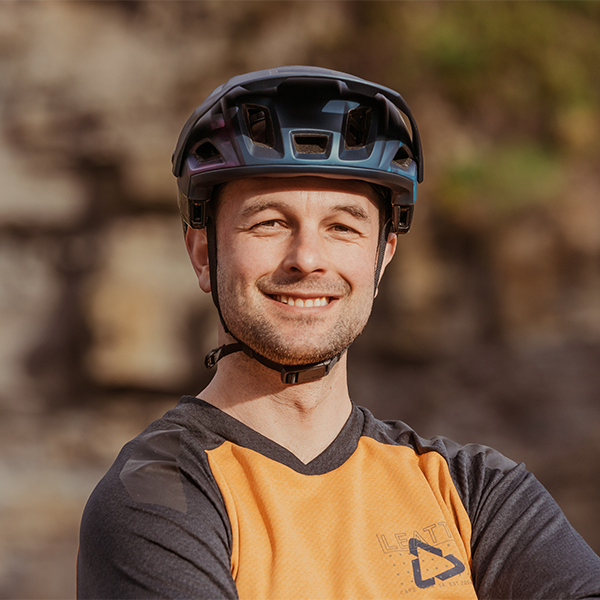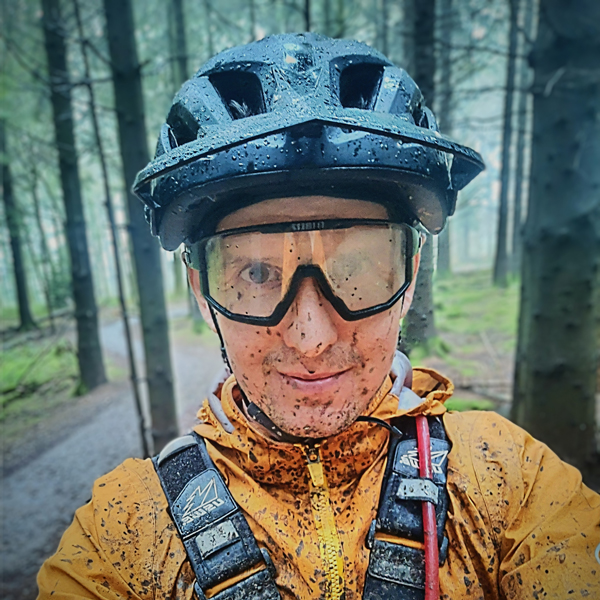The best winter mountain bike tyres can transform your riding when the weather turns and the trails are muddy.
Winter MTB tyres are the most aggressive type of mountain bike tyre. They have tall knobs designed to dig into softer ground and wide spaces between them to help ‘clear’ built-up mud. Softer compounds are needed to help the tyre ‘stick’ to wet rocks, roots and harder trail surfaces, providing traction when the tread can’t chew into the ground.
The penalties for the extra grip are lower rolling speeds, increased wear and extra weight. Those big, blocky knobs provide plenty of friction when buzzing along flatter sections. It’s the same for the softer compounds and heavier casings – neither will help you roll faster when you want to conserve speed.
That tacky tread will also be quick to wear down, while the weight and muted feel of the casings can slow down handling and will certainly increase the amount of effort you need to exert to climb to the top of the trails.
But if you're riding your mountain bike in the winter, the pros of these sturdy tyres will certainly outweigh the cons.
Following our most recent group test, the Pirelli Scorpion Race Enduro was the best on test, thanks to its super tacky compound, accuracy and braking performance.
Best winter mountain bike tyres
Best on test: Pirelli Scorpion Race Enduro T
SQUIRREL_TEXT_13162435

- £80 as tested
- Pros: Super-tacky compound sticks to any trail surface; accurate steering; amazing braking traction; damped carcass; robust feeling when loaded
- Cons: Hard to install and inflate
The Scorpion uses Pirelli’s DualWALL casing, with a dual-ply 120 TPI carcass, reinforced with a rubber insert around the bead. The tread pattern features angular, aggressive centre blocks, and lugged, tall shoulder blocks with wide spacing.
Feeling seriously tacky and sticky, the Pirelli’s rubber clings and sticks to the slimiest and most slippery rocks and roots. Tyre deflection is almost zero – it tracks your chosen line through chaotic sections of trail, barely flinching, and makes steering control impeccable.
- Read more: Pirelli Scorpion Race Enduro T review
SQUIRREL_13162435
Maxxis High Roller III
SQUIRREL_TEXT_13162398

- £75 / $105 as tested
- Pros: Easy inflation; excellent bite in soft ground; predictable on hardpack; damped carcass; versatility
- Cons: Weighty; lots of hand strength needed for installation
The Maxxis High Roller III is the updated version of the legendary High Roller II. The successor features an overhauled tread pattern with taller, chunkier knobs, and is designed for increased grip in mixed conditions and softer terrain. It still uses Maxxis’ tried and tested carcass and compound recipe, resulting in excellent performance.
While the High Roller III DH Casing is weighty, the amount of damped control, steering support and vibration muting available is more than worth it. The mid-spike tread pattern is also more versatile than you’d expect – it excels in hardpack and grease just as convincingly as it does on softer, looser ground or over roots and rocks.
- Read more: Maxxis High Roller III review
SQUIRREL_13162398
Michelin Wild Enduro MS Racing Line
SQUIRREL_TEXT_13162432

- £85 as tested
- Pros: Super-tacky compound; squishy, smudgy rubber provides grip everywhere; damped and stable carcass; very predictable
- Cons: Could clear mud better; hard to install
The Wild Enduro’s aggressive tread pattern and super-sticky Magi-X compound make it one of the grippiest and most predictable tyres you can buy. The tacky rubber helps you stick your chosen line with virtual impunity regardless of whether it’s across roots, rocks, hardpack, grease or soft ground.
Despite being designed for mixed-to-soft terrain, the Michelin tread works well in a wider range of trail types than we initially expected. Its carcass support and damping are exceptional, no matter how hard you’re loading it up into turns or how rough the trail is. The downside is the tyre doesn’t clear mud as well as other models.
As an all-round winter tyre, there’s lots to love about the Wild Enduro MS Racing Line.
- Read more: Michelin Wild Enduro MS Racing Line review
SQUIRREL_13162432
Schwalbe Magic Mary Radial
SQUIRREL_TEXT_13166870

- £79.99 / €79.90 as tested
- Pros: Very grippy in soft terrain; plenty of chemical grip on hard or greasy surfaces; damped and muted; carcass deformation is well-balanced with strength; easy to fit
- Cons: More prone to burping than bias-ply tyres
The Magic Mary Radial rewrites the rules on how mountain bike tyres are made, with its radial ply construction. Schwalbe claims this improves grip and comfort, and increases the contact patch with the ground.
On the trail, the Magic Mary lives up to the hype. When hammering over soft terrain, the tyre chews and munches at the ground, deforming around the trail and delivering an immense amount of traction on tap when you want to make challenging line choices or change direction.
There are some downsides, though. Higher speeds and forces get the carcass to deform and maintain grip the most, meaning that at lower speeds, such as when you’re climbing, the tyre can slide on rocks and roots at extreme angles. It also lacks the overall strength of more traditional bias-carcass tyres of similar weight, making it more prone to burping.
- Read more: Schwalbe Magic Mary Radial review
SQUIRREL_13166870
Schwalbe Magic Mary Super Trail ADDIX Ultra Soft
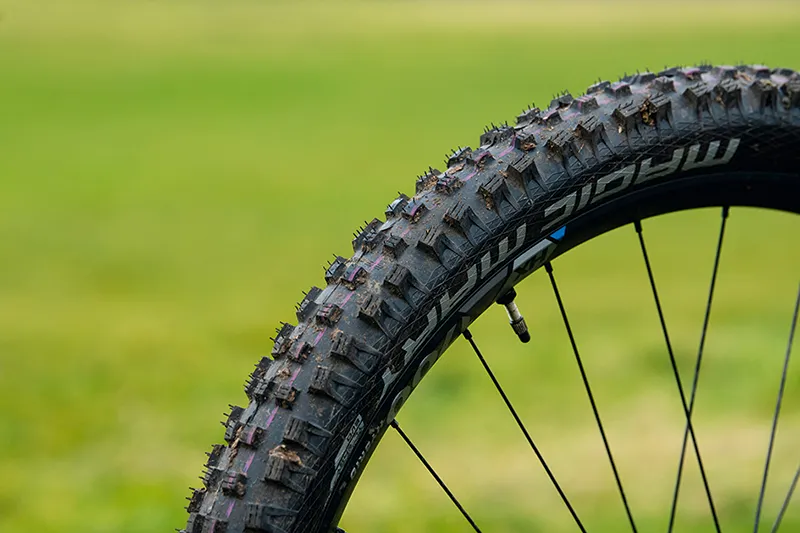
- Price: £67 (as tested)
- Weight: 1.23kg
- Size: 29x2.4in
- Measured width: 2.3in
The Schwalbe Magic Mary is still one of the best all-rounder winter tyres you can buy. It holds its line and damps bumps well for its weight.
Its grip is impressive in most conditions, through corners and on cambers. The Ultra Soft compound makes short work of slippery roots and rocks. Mud clearance is good, too. The confidence it delivers is impressive. Tubeless seating was easily dispatched with only a track pump.
We did, however, have to use a tyre lever to fit it. Its carcass isn't quite as stable as some of the other tyres we've tested. It is also fairly heavy for a trail tyre and made from soft rubber – it isn’t the easiest to pedal and rolls relatively slowly, although Schwalbe does offer firmer compounds.
WTB Vigilante SG1

- £80 / $90 / €75 as tested
- Pros: Immense grip on soft ground; tacky rubber clings to rocks, roots and greasy hardpack; damped and muted feel; puncture protection; carcass stability
- Cons: Hard to install; weighty
WTB’s new Vigilante SG1 has boosted carcass strength and a reformulated rubber compound to give exceptional grip and damping on the trails, but it’s very heavy, tipping the scales at a whopping 1,570g.
With a front bias, the aggressive tread pattern and reinforced shoulder knobs of the Vigilante put grip at the forefront, no matter the terrain. Traction and control are amazing, and the damped feel combines with its weight to steamroller down the gnarliest trails. They’re very heavy and tricky to install, but hard chargers will love their stability.
- Read more: WTB Vigilante SG1 review
Continental Argotal Enduro Soft
SQUIRREL_TEXT_13162410

- £75 as tested
- Pros: Very grippy in the softest ground; relatively lightweight; one of the more affordable options; good carcass stability
- Cons: Rubber compound could be softer; Can feel pingy; hard to install
Continental’s Argotal Enduro Soft is designed to work best in loose terrain, boasting a widely spaced, cut-spike-style tread pattern that has exceptional grip on soft ground. However, while it digs deeply into the trail’s surface, it isn’t as good on rocks and roots.
This Soft compound tyre is the tackiest rubber available in Continental’s Enduro casing and, while the grip is good on slimy rocks and roots, its compound isn’t as tacky as other brands.
In soft dirt, however, the Argotal is almost peerless. The chunky, well-spaced blocks bite and chew their way through the trail’s surface to provide exceptional grip and control.
- Read more: Continental Argotal Enduro Soft review
SQUIRREL_13162410
WTB Verdict TCS Light/High Grip
SQUIRREL_TEXT_13084052
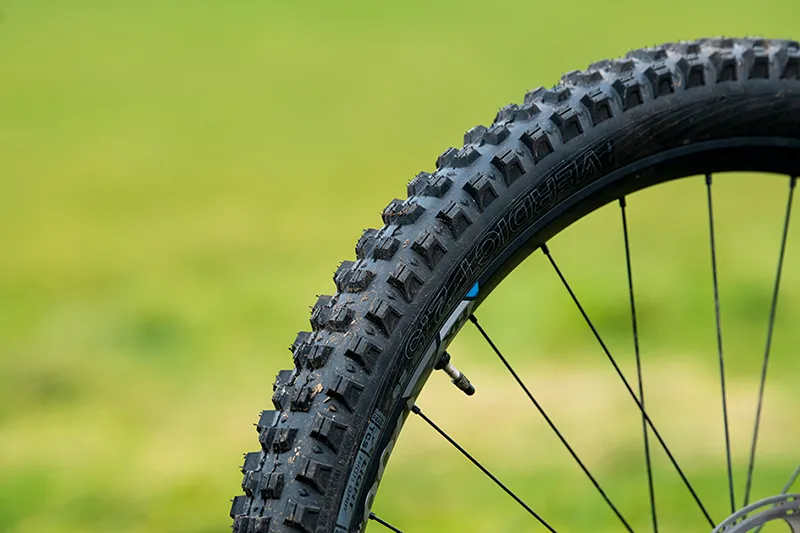
- Price: £60 (as tested)
- Weight: 1.16kg
- Size: 29x2.5in
- Measured width: 2.32in
The WTB Verdict is one of the most aggressively treaded winter tyres we've tested and performs excellently in heavy mud as a result, its well-spaced knobs biting into the dirt with ease.
WTB’s soft ‘High Grip’ rubber compound means it’s good on roots and rocks, too, and deforms well over obstacles on firmer trails to improve grip and comfort.
Unlike some tyres on test, we had to resort to using an inflator to seat these. The single-ply casing also isn’t as sturdy as some, although WTB offers a heavier ‘Tough’ option if you want a more stable tyre.
While it doesn’t get knocked off-line easily, the lighter casing means bumps aren't as well damped as other tyres on test. Rolling speed is middling, too.
SQUIRREL_13084052
Also consider…
These tyres scored fewer than four out of five stars, but are still worth considering.
Continental Der Baron Projekt
SQUIRREL_TEXT_13096698
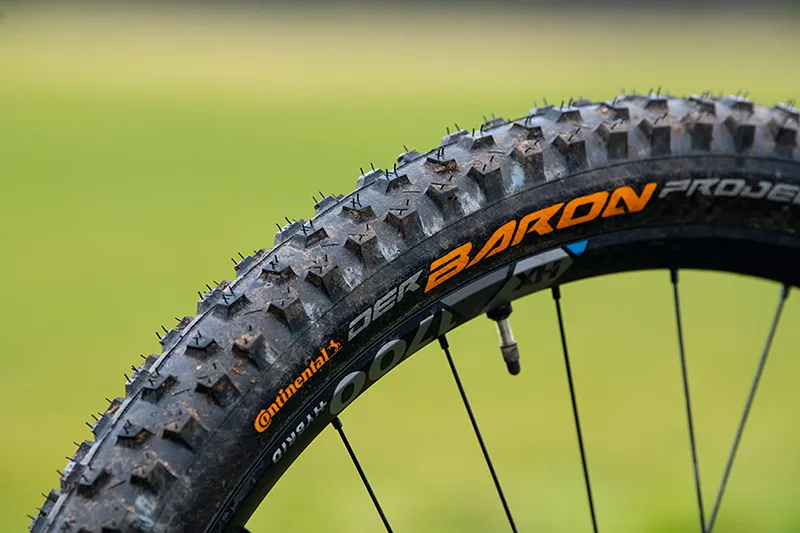
- Price: £65 (as tested)
- Weight: 1kg
- Size: 29x2.4in
- Measured width: 2.34in
We were able to fit the Continental Der Baron Projekt with a track pump and without grabbing the tyre levers.
Its wide tread spacing clears mud well. If you want a winter tyre for ‘trail’ rather than off-piste/enduro use, the Der Baron Projekt is one of the lightest we've tested and one of the fastest-rolling, too, so it performs well on hardpack.
However, with one of the shallowest treads on test, it struggles to find traction in thicker mud and the shorter side knobs don’t bite into cambers or corners as aggressively.
The thin casing makes it less stable than others here, and the wide-spaced blocks give it a less predictable feel.
SQUIRREL_13096698
Vittoria Mota 2PLY
SQUIRREL_TEXT_13166876
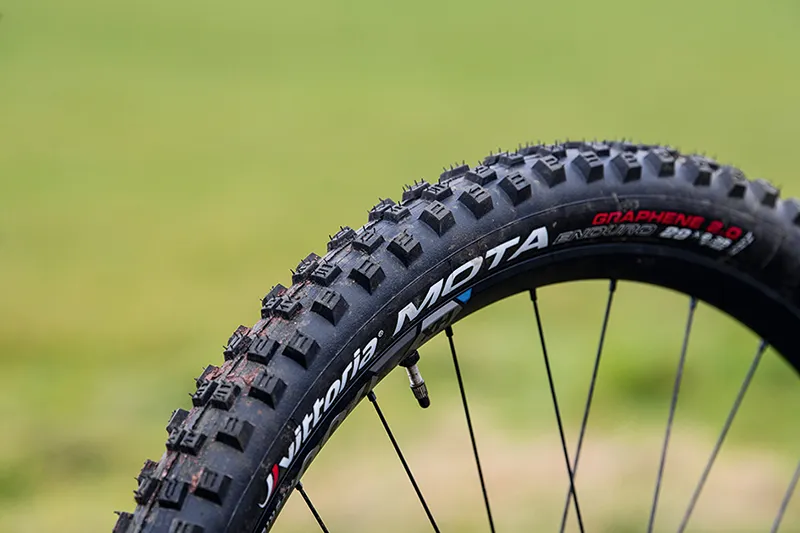
- Price: £60 (as tested)
- Weight: 1.24kg
- Size: 29x2.35in
- Measured width: 2.24in
We were able to fit the Vittoria Mota without tools, but still found the dual-ply casing to be incredibly tough for its weight.
This meant we could run lower pressures without suffering any flats. Its narrow width means you can ride with great accuracy, yet it still has good stability.
We had to use a tyre inflator to seat the bead on the rim, after struggling with a track pump. The shallow tread is also quick to become overwhelmed in thicker mud and the Moto doesn’t have class-leading grip.
It’s better suited to wet trails with a firm surface underneath than claggy tracks.
SQUIRREL_13166876
Pirelli Scorpion Enduro S Classic
SQUIRREL_TEXT_13084053
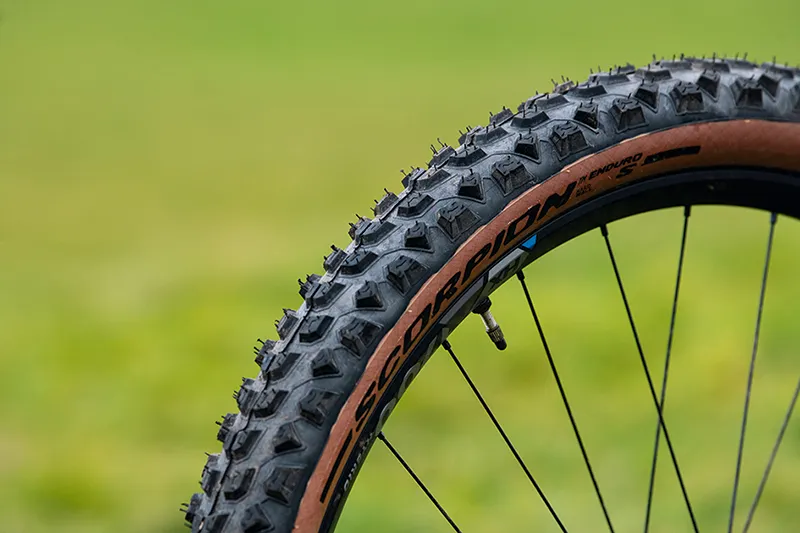
- Price: £70 (as tested)
- Weight: 1.1kg
- Size: 29x2.6in
- Measured width: 2.48in (at 21psi)
Installing the Pirelli Scorpion Enduro S Classic was easy without tyre levers and the casing inflated with a track pump. It’s also light for an enduro-spec tyre.
The tread blocks are relatively deep and their large volume adds extra puncture protection, yet they still roll well.
Pirelli’s SmartGRIP compound is firm and doesn’t conform to the ground, slippery roots or rocks as well as other tyres we have tested.
The large tread blocks don’t bite into soft dirt either, making the tyre better suited to wet hardpack trails than mud. We found we weren’t able to commit to our lines as confidently with this tyre.
SQUIRREL_13084053
How we tested winter mountain bike tyres
For our latest winter mountain bike tyre test, Alex Evans tested six tyres back-to-back on both the front and rear.
He used the same 30mm internal-width rim throughout testing and inflated each tyre to the same or an equivalent pressure, allowing for small differences in volume (bigger tyres require slightly lower pressures).
To test grip, he rode a wide gamut of terrain types, including trail-centre laps, muddy, boggy trails and rocky, rooty descents, while high-load and high-speed downhill tracks helped him assess comparative casing stability.
Why you can trust BikeRadar
BikeRadar has been an authority on bikes and cycling tech since its inception in 2007, delivering the world’s best riding advice.
We have experts testing all types of bikes, parts, clothing and accessories, from road, mountain and gravel bikes to commuting, bikepacking and electric bikes.
Our reviews are always editorially independent – with no exceptions. Our reviewers comprehensively test all products in the real world, always reflecting on performance, value and the wider market when delivering their verdicts and review ratings.
We have more than 15,000 product reviews available at your fingertips, as well as expert buying, maintenance, training, skills, health and fitness advice.
Our annual Bike of the Year test is an industry benchmark and the BikeRadar team consists of some of the most experienced riders and testers in the business.
What to look for in a winter mountain bike tyre
Profile
The profile of a tyre is best thought of as a cross-section if you chopped out a slice of the tyre.
Squarer tyres bite harder into slippery turns and off-camber sections. Rounder tyres offer a more predictable drift – they generally roll faster and carry speed better through flat corners. Remember, wider rims make any given tyre squarer.
Tread pattern
Bigger gaps between tread blocks help tyres shed mud, while tall blocks improve grip in soft conditions because they ‘bite’ into the terrain.
Tighter-spaced blocks have less rolling resistance and are best suited to dryer or hardpack conditions.
Casing
Often overlooked, the casing – or carcass – is the (usually) nylon-reinforced body of the tyre.
Designing a carcass is a balancing act between weight and rolling resistance on the one hand, and puncture-resistance, damping and stability on the other.
Carcass design has a huge effect on the rolling resistance and traction offered by a tyre.
You can read our full guide to tyre casings.
Compound
The compound of a tyre describes the rubber mix used in the tread.
Softer rubber sticks better to hard surfaces and offers more damping, but increases drag and wears faster. The softness is measured in durometer, with lower numbers (e.g. 40a) indicating softer rubber.
Damping
A well-damped tyre is one that uses a thick, rubbery casing and soft tread compounds that absorb the energy of bumps to resist bouncing off them.
This results in a calmer ride and more traction, but inevitably means more rolling resistance and weight.
Bead
This is the lipped edge of the tyre casing that locks into the rim’s hook (if it has one) once the tyre is inflated. The connection between bead and rim determines how easy it is to inflate a tubeless tyre and whether it’s airtight.
Width
Not all tyres are created equal, and few are actually the size manufacturers claim. Be sure to check that your frame, fork and rims are compatible with the width of tyre you’re looking to buy.
Usually, the wider a tyre is, the heavier it’ll be for any given casing type, because more material is needed in its construction.

